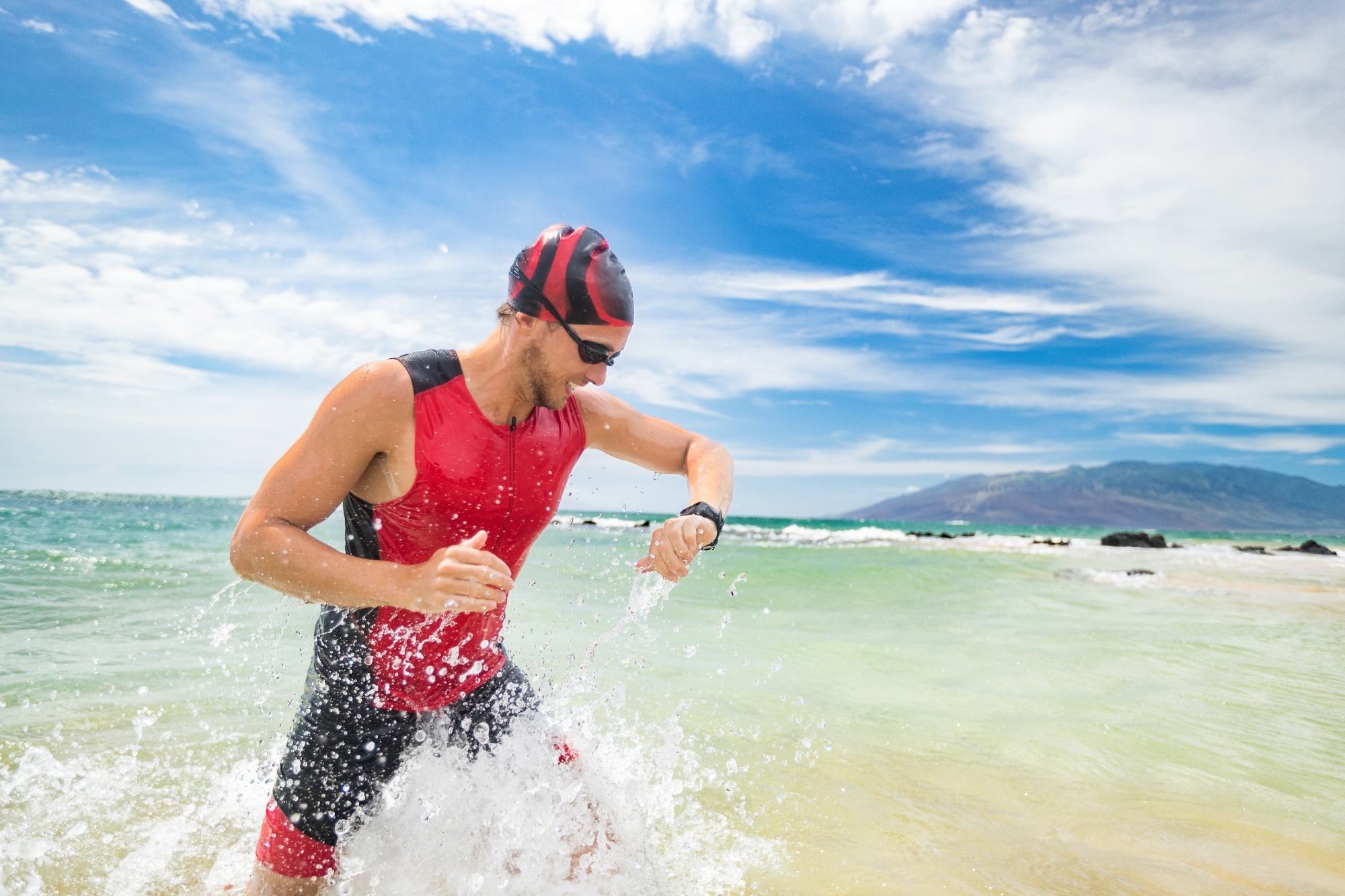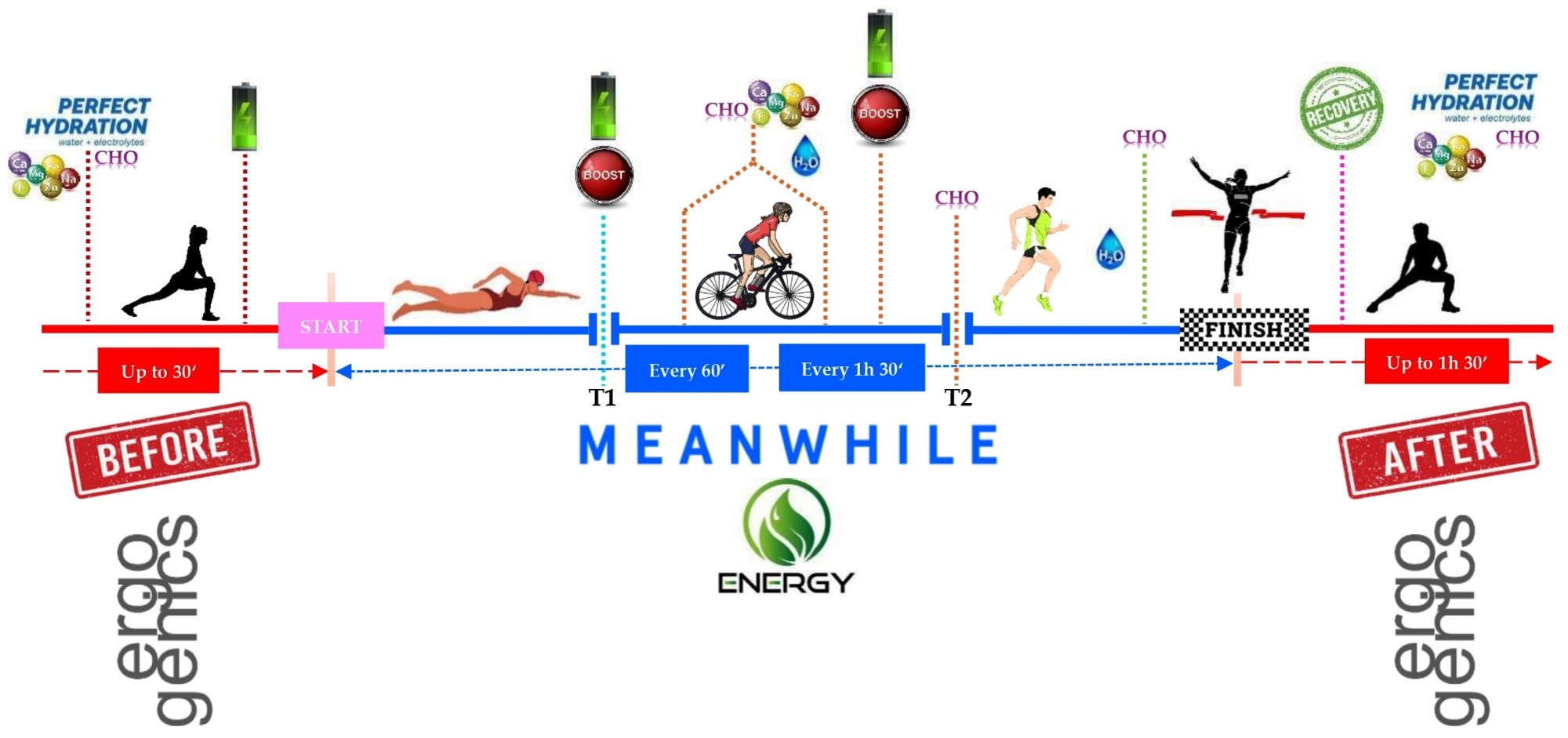A new systematic review reveals the nutritional and recovery strategies that help triathletes stay stronger, recover faster, and reduce health risks, empowering athletes and coaches with science-backed guidance for every race.
 Review: Triathlon: Ergo Nutrition for Training, Competing, and Recovering. Image Credit: Maridav / Shutterstock
Review: Triathlon: Ergo Nutrition for Training, Competing, and Recovering. Image Credit: Maridav / Shutterstock
In a recent systematic review published in the journal Nutrients, researchers systematically evaluated and synthesized findings from an initial pool of 1,628 studies, ultimately including 35 nutrition, supplementation, and recovery-focused articles to scientifically optimize the holistic performance of triathletes. The review is registered in PROSPERO and adheres to PRISMA guidelines, enhancing its methodological rigor. It highlights the unique metabolic and nutritional demands of the sport, aiming to provide coaches, clinicians, and athletes with the practical knowledge required to sustain and promote optimal training, race-day performance, and recovery.
Study findings reveal that triathletes (both men and women, with women particularly vulnerable due to dietary patterns and physiological factors) are at heightened Relative Energy Deficiency in Sport (RED-S) risk, underscoring the importance of muscle glycogen balance, sufficient hydration, and carbohydrate intake in meeting triathlon’s unique demands. Regular energy status monitoring under professional supervision and timely supplementation can help mitigate this risk, allowing tomorrow’s triathletes to run, cycle, and swim faster and more safely than ever.
 Potential nutrition strategy.
Potential nutrition strategy.
Background
‘Triathlon’ is an umbrella term for multi-discipline sporting events that combine running, cycling, and swimming into a single race. The sport’s subtypes range in from the relatively short ‘Super Sprint’ (350 m swim, 10 km cycle, 2.5 km run) to the grueling ‘Ironman’ (3.86 km swim, 180 km bike, 42.2 km run), with each event type imposing a unique set of metabolic demands, specifically: 1. muscular endurance, 2. aerobic performance, and 3. energy management upon triathletes.
Maximizing triathlete performance while minimizing injury presents unique nutritional and recovery considerations. While several athletes leverage supplements (ergogenic and nutritional), misconceptions regarding their use and insufficient nutritional education among triathletes and their coaches often result in suboptimal or maladaptive outcomes.
In-depth knowledge about the pros and cons of different nutritional practices (including ergonutrition and supplement use) and recovery methods would enable individual-specific performance optimization, allowing triathletes to train and race more effectively while protecting their long-term physiological and psychological well-being.
About the study
This systematic review compiles current scientific literature evaluating triathlon-specific nutrition and recovery during training (pre-, intra-, and post-training) and competition periods. It aims to enhance athletes’ well-being and performance by identifying optimal triathlon support strategies and highlighting topics for future research in sports nutrition.
The review complies with the Preferred Reporting Items for Systematic Reviews and Meta-Analyses (PRISMA) guidelines. It leverages the Population Intervention Comparators Results Study Design (PICOS) model to define review inclusion criteria. Study selection was done via a custom search of 11 electronic science databases: 1. Web of Science (WOS), 2. MEDLINE (PubMed), 3. Cochrane Library, 4. SciELO Citation Index, 5. KCI-Korean Journal Database, 6. ICTRP, 7. Embase, 8. CT.gov, 9. Scopus, 10. Current Contents Connect, and 11. EBSCO.
A sequential screening process (title, abstract, full text) was used to select articles that: 1. Focused on triathletes, 2. Employed non-randomized study designs, and 3. Investigated nutrition, recovery, or ergogenic supplements. The included studies were categorized into 1. Nutritional studies, and 2. Studies examining associations between nutrition, recovery, and performance.
Extracted review data included: 1. Study source, 2. Methods, 3. Sample cohort, 4. Intervention details, and 5. Study outcomes. Data quality and literature gaps were assessed using the Strengthening the Reporting of Observational Studies in Epidemiology (STROBE) and Cochrane Collaboration guidelines, as well as Oxford’s Quality Rating System bias tools. Finally, outcomes of key variables (carbohydrate and protein intake, fluid balance, antioxidant use, supplement efficacy) between cases and controls were evaluated.
Study findings
Initial database searches identified 1,628 potential articles for inclusion in the systematic review. Eliminating duplicates and excluding irrelevant and poor-quality studies narrowed this article pool to 35 high-quality publications. Descriptive and statistical analyses revealed that maintaining glycogen levels, specifically through strategic carbohydrate loading, is the most critical performance-defining variable during training and competition.
The thermoregulation and endurance aspects of triathlons heavily depend on optimal hydration monitoring and electrolyte (sodium level) management. Unfortunately, most included samples (triathletes) were observed to demonstrate poor hydration practices during the competition phase, which increases the risk of dehydration and associated performance and physiological degradation.
Notably, the review identified substantial nutritional education deficits among triathletes, particularly during post-exercise recovery practices, which resulted in impaired recovery-phase muscle repair, glycogen resynthesis, and overall well-being. Female participants were especially vulnerable to energy deficits, some of which were linked to menstrual disturbances and adverse psychological outcomes such as Relative Energy Deficiency in Sports (RED-S) and injury.
However, all triathletes, regardless of gender, are at risk of Low Energy Availability (LEA) and RED-S, with unique dietary patterns (such as high-fiber and plant-based diets) potentially increasing vulnerability, especially among women.
The review emphasizes the importance of implementing specific recovery strategies, including adequate carbohydrate and protein intake after exercise, sufficient sleep, cold water immersion, and the use of compression garments, to optimize recovery and minimize injury risk.
Encouragingly, when used appropriately, ergogenic and nutritional supplements (e.g., caffeine, krill oil, antioxidants, beetroot extract, citrulline, branched-chain amino acids (BCAAs), and probiotics) were found to enhance recovery and performance. The evidence is strongest for carbohydrate supplementation, with emerging but less robust support for other types of supplementation. Supplementation should always be individualized and supervised by qualified professionals. This review emphasizes the importance of scientifically informed professional guidance, tailored to the athlete’s metabolic needs, previous training experience, and the demands of their triathlon subdiscipline, to achieve optimal progress in this highly demanding sport.
Conclusions
This review highlights nutritional priorities for triathletes, emphasizing the importance of maintaining glycogen balance and sufficient hydration to achieve and sustain peak performance throughout both training and competition phases. It elucidates the substantial physiological benefits of supplements but highlights the need for extensive athlete education and strategic monitoring and planning to unlock their full potential.
Comprehensive and individualized nutritional strategies, continuous education, and careful recovery planning are essential to mitigate energy deficits, optimize performance, and promote athlete health in triathlon.
Journal reference:
- Miguel-Ortega, Á.; Rodríguez-Rodrigo, M.-A.; Mielgo-Ayuso, J.; Calleja-González, J. Triathlon: Ergo Nutrition for Training, Competing, and Recovering. Nutrients 2025, 17, 1846, DOI – 10.3390/nu17111846, https://www.mdpi.com/2072-6643/17/11/1846